Blog, Reconciliation, Social Identity and Conflict
Social stigma impedes re-integration of child soldiers
By Christine Straw Disturbingly, in wars across the world armed groups are recruiting children and teens, using them as fighters, cooks, porters, spies, and for sexual purposes. Research in post-conflict environments, such as Sierra Leone, has shown that once child soldiers leave the militarized life, they are likely to experience rejection, stigma, suspicion and mistrust by their family and the community that impedes their psychosocial adjustment (Bettencourt, Agnew-Blais, Gilman, Williams, & Ellis, 2010). Recent research in Colombia (Denov & Marchand, 2014) focuses on child returnees’ experience in a context where the conflict is still ongoing. Across over 50 years of civil war in Colombia, 11-14 thousand children have been used by guerillas and paramilitaries – and the practice is continuing. Former child soldiers experience constant transitions and adaptations as they deal with displacement, family reunification and the violence of the past. To understand their experience of reintegration within ongoing conflict, the researchers interviewed 22 former child soldiers enrolled in a government sponsored reintegration program. They found that the youth experienced recurring rejection and stigmatization from their families and communities. They reported being stereotyped and labeled, leading them to feel a loss of status. Their experience of being targets of community judgment, mistrust and discrimination impacted their ability to feel safe, establish relationships, and find employment and housing. Many internalized the stigma and felt “abnormal”, “dirty”, or “stained” rather than “normal” and “clean”. Because of this, they often considered concealing their past, and even creating an alternative story.
While more research is needed to understand exactly how living with stigma impacts the reintegration of child soldiers, it’s clear that reducing stigmatization and distrust should be an integral part of any program seeking to re-integrate traumatized youth. Conventional reintegration programs often focus on providing opportunities for healing from past trauma and offering avenues for returnees to support themselves. The current research suggests that community wide interventions aimed at preventing the daily trauma of discrimination should be a key part of a sustainable reintegration solution.
References:
Betancourt, T. S., Agnew-Blais, J., Gilman, S. E., Williams, D. R., & Ellis, B. H. (2010). Past horrors, present struggles: The role of stigma in the association between war experiences and psycho- social adjustment among former child soldiers in Sierra Leone. Social Science & Medicine, 70, 17– 26. doi:10.1016/j.socscimed.2009.09.038
Denov, M., & Marchand, I. (2014). “One cannot take away the stain”: Rejection and stigma among former child soldiers in Colombia. Peace and Conflict: Journal of Peace Psychology, 20(3), 227-240. http://dx.doi.org.ezproxy.cul.columbia.edu/10.1037/pac0000039
Photo Source: http://colombiareports.com/wp-content/uploads/2014/02/child_farc_elpais.jpg
Categories: Blog, Reconciliation, Social Identity and Conflict
Published September 3, 2015
